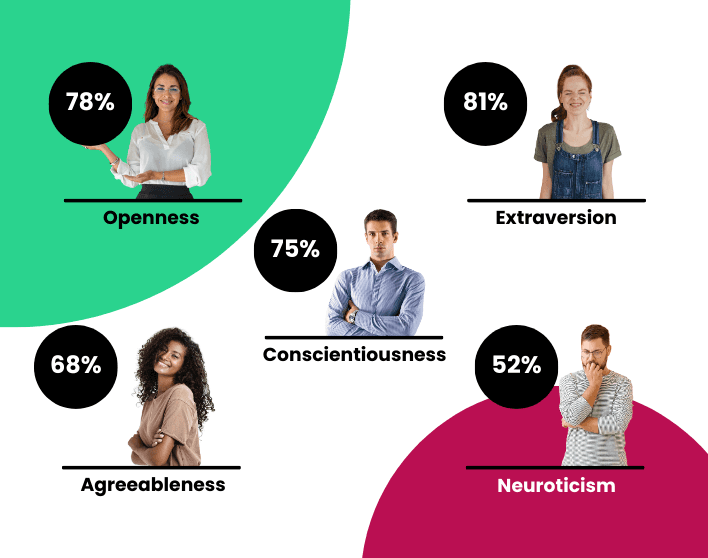The Bryq Team
HR Experts
If you constantly find yourself hiring underperforming staff, there must be a flaw in your hiring process. The personality traits of job candidates are highly relevant to how they behave in the workplace. Discover how to find out more about the personality traits of your applicants so that you can match the best-suited person to the position you have available.
What are Personality Traits?
Personality traits are the personal characteristics that make you who you are. Some people are more extraverted, and social situations energize them, while others are more introverted and being around others may be draining. People can be organized or spontaneous, detail-focused or big picture thinkers, cautious or confident.
How you think and behave is ultimately what makes up your unique set of personality traits. While you may share some characteristics with others, no two people are exactly the same, and that’s thanks to our mix of personality traits.
Why Employers Use Personality Tests
More recruiters are now realizing what valuable insights personality traits can provide into candidate behavior. If you want to predict how someone may behave in the workplace and in a particular role, personality traits can offer that understanding.
Determine Culture Fit
It can be hard to tell whether a potential new staff member would be a good culture fit for your organization before you make a hiring decision. By finding out more about that person’s personality traits, you can more easily determine whether they would be compatible with your company culture. For example, if you are hiring for a startup in a rapidly changing environment, this requires quick decision making, adaptability, and excellent forecasting abilities. Someone without these traits may not be a suitable employee.
Find out Communication Style
Ever wished that you knew ahead of time about the communication style of your employees? Testing for personality traits can reveal what type of communication style an applicant has. Find out whether they are quite direct, more compassionate, or soft-spoken. This can have a significant impact on they will behave in the role and how they will interact with coworkers and clients.
Improve Hire Quality
If you want to make the best decision in your recruitment process, knowing about the applicants’ personality traits is of critical importance. How else would you know whether your preferred candidate is the ideal person to put in this position? By learning more about how recruits may behave in the workplace, you can ensure that you are hiring for job fit.
Increase Retention
When you hire the best person for the job, it is more likely that they will be more satisfied and productive in that role. This is what leads to someone staying in a position for longer – if they are happy with what they are doing and feel that they are performing well, they are unlikely to leave quickly. Reduce your organization’s turnover rate by using personality traits to hire the right person for each newly available position.
How to Test for Personality Traits
The big question is – how can you accurately test job candidates on their personality traits? There are now many impressively accurate pre-employment tests designed to discover more about the personality traits of job candidates.

Rather than trying to uncover more about someone’s characteristics in an interview, you can more accurately assess the applicants’ personalities with a personality test. Gain valuable data that you can use to inform your hiring process moving forward.
Start by determining which traits are most vital for the position you’re hiring for. Then find a personality assessment that evaluates respondents on these traits. This is best implemented after resume screening and can be used to inform your shortlist for interview. Simply analyze the results of the personality test to see who has the skills required for the position; these are the people you will invite to interview.
Types of Personality Tests
Now that many recruiters are using personality tests before employing someone, there are a few types that have sprung up in popularity.

Myers-Briggs Type Indicator
Otherwise known as MBTI, the Myers-Briggs Type Indicator is perhaps one of the most well-known personality tests used in the workplace. In fact, many companies in the Fortune 100 use it during recruitment to find out more about their candidates.
This test places people in one of two categories for each type of trait, covering 16 personality types in total. Each personality type is best suited to a different kind of role, helping recruiters to uncover whether this is the right individual to hire for their available position.
DiSC Behavior Inventory
Another incredibly popular way to measure personality traits is with the DiSC model. DiSC is an acronym that stands for the personality traits it measures; dominant, influential, steady, and compliant. Created to measure professional behavior, this test can also measure how well the respondent performs within a team.
SHL Occupational Personality
Directed specifically for use in the workplace, the SHL Occupational Personality questionnaire seeks to understand how the behaviors of respondents impact their performance at work. Areas applicants are evaluated on include emotions, relationship with people, thinking style, and feelings. They must choose between four statements to determine which one best describes how they think or act.
HPI (Hogan Personality Inventory)
Finally, the HPI has been used on over 200 different occupations to determine candidate suitability. It is a reliable way to measure an individual’s temperament and job fit for a position. The HPI sets out six occupational scales and seven primary scales that it measures candidates on, in addition to 42 subscales. It is a thorough method of evaluation that is popular with businesses worldwide.
If you want to better understand candidates’ behaviors, measure their personality traits. This can help you discover who the best person for the position may be and how well they may perform once in that role. Use a personality test to find out more about your job candidates and make the best possible hiring decision.








